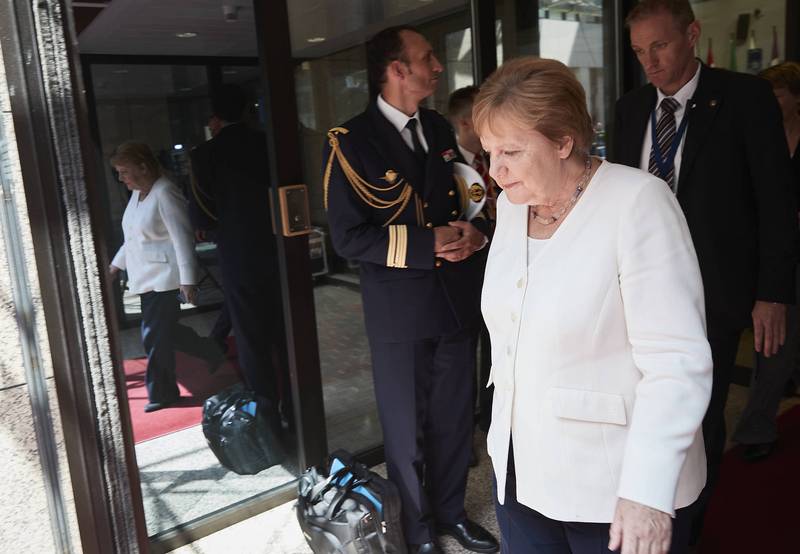Negotiations on the EU Top Jobs Marked the End of an Era*
Adelina Marini, July 4, 2019
 Negotiations on the most important appointments in the EU show that the era of Adenauer-ism, of the culture of consensus, and the common European interest is about to go extinct. For the first time since the EU has been created, finding a compromise is so difficult and at the same time, so easy. At the summit, the battle was fought on several fronts: East-West (new vs. old member states); illiberals against liberals; pro-Europeans against sole proprietors; for or against the Spitzenkandidaten system; the civilisation fault line within the EPP.
Negotiations on the most important appointments in the EU show that the era of Adenauer-ism, of the culture of consensus, and the common European interest is about to go extinct. For the first time since the EU has been created, finding a compromise is so difficult and at the same time, so easy. At the summit, the battle was fought on several fronts: East-West (new vs. old member states); illiberals against liberals; pro-Europeans against sole proprietors; for or against the Spitzenkandidaten system; the civilisation fault line within the EPP.
The first part of the battle (within the European Council) ended with a victory for the common European best interest. A very important victory was also noted in gender balance. So far, the principle was like the Loch Ness monster - everyone talks about it, but no one has ever seen it. Women got nominated for two out of the four highest European positions, the two most important at that - the European Commission and the European Central Bank. Surprisingly, German Defence Minister Ursula von der Leyen, a faithful ally of Chancellor Merkel, got nominated for the chair in the Berlaymont. IMF chief Christine Lagarde was proposed for the position in Frankfurt, a nomination that has been brewing for months if not years.
Last but not least, France came out the biggest winner of the meeting, while Eastern Europe lost the entire championship - the four most important positions are distributed among the most pro-European states and old members - Germany, France, Spain, and Belgium. Last but not least, it was a devastating defeat for Weber as a person and a politician, and in a larger aspect for the EPP - the party lost absolutely everything it had been betting on for nearly two years - the candidate for which the party trampled over the policy of consensus and turned into a cheap Eastern European goon that only knows how to blackmail from a position of power. The party also lost the principle of leading candidates by which it swore, thus murdering what it claimed to be the rudimentary building blocks of European democracy. This meeting was also the last major appearance for an epoch in European politics - Chancellor Angela Merkel.
Last of the Adenauer Christian-Democracy Mohicans
One of the saddest sights during the negotiations was the dousing of the European political star of German Chancellor Angela Merkel. Seen as the world's most influential woman until recently, as the leader of the liberal world and carrier of the Adenauer culture of compromise, proved once again that she is not very good in the art of European bargaining, but demonstrated once again that she is capable of honestly admitting her mistakes. Her biggest one this time was that she underestimated the shifting of political layers in Europe, working with the presumption that Germany's word will always have the weight it has had since the unification. Not only did she underestimate the shifting of the layers but also the transformation of the European People's Party (aided by her action or inaction) from a consensus-seeking pro-European formation whose aim is to keep the continent from the destructive power of communism to a destructive populist political force that lives just for itself and is prepared to do anything, including giving shelter to newly hatched Eastern European Nazis, just as long as it retains power.
Angela Merkel has often sacrificed national and party interests in the name of European compromise, drawing on the strength of her authority in her native Germany. But now the situation is different. This time, the domestic situation in Germany forced her into making mistake after mistake. The first one was to support Manfred Weber's spitzenkandidature for the sole purpose of forming a coalition government after six months of fruitless negotiations. Germany's domestic politics spilled over to a European level and became decisive for Mrs Merkel, thus pulling the European best interest into a trap.
Her second big oversight was during the G20 Summit in Osaka, where she made a backstage deal with a small group of countries to place Frans Timmermans at the head of the Commission and in turn get at least two of the other posts for the EPP. The idea itself is not bad, because thus a few things are gained with one stroke: the Spitzenkandidat system, in which Merkel herself does not believe very much, gets preserved, but it was done in a typical Merkelian fashion - backstage, with the hope that there is no way this would not fly, as it comes from Germany and France.
Macron was inclined to make this compromise, though he is the fiercest adversary of the leading candidates' system. This quite naturally provoked sharp reactions at the second round of negotiations last Sunday. Merkel herself admitted after the 20-hour negotiating marathon that she had made a mistake by failing to explain her plan well enough and inform the others about it, contributing to the final breakdown of the Spitzenkandidaten model. EPP's unwillingness to make concessions and its peremptory tone finished off the procedure.
Liberals vs illiberals
Her mistake brought strong dissent in the EPP. The illiberal states started grumbling about Frans Timmermans, as they see in him a threat to their anti-liberal regimes. This was, however, a signal that a liberal Western Europe is not inclined to surrender territory to newly hatched Eastern dictators. The leaders' meeting was the first major battle between liberals and illiberals since the European elections. The sharp reactions against Timmermans caused French President Macron to break out, stating that the EU has derailed and that this is proof that there should be no enlargement until the EU is radically reformed. Spanish Prime Minister Pedro Sánchez (he is a member of PES) was no less furious, saying that a candidate could not be voted down just because of his views on the rule of law.
The former accommodating pro-European centrist party, bearing the values and views of Konrad Adenauer and Helmut Kohl's unification mission, became the enemy of the liberal-democratic EU within under Angela Merkel's silent gaze. The result is that the new EPP, that of Fidesz, GERB, HDZ, and many other right-wing formations, has lost everything. The EPP-ism of Angela Merkel won - the old generation of EPP members, for whom European interest is above all. The Chancellor stood out like the last of the Mohicans of the old EPP. The top positions negotiations is probably the last major European battle before Mrs Merkel retires. Perhaps the EPP will not be the same after her. It is even possible that it  will split. With her actions, she made a final attempt at preserving the remains of the Adenauer model, where European interest is leading and is being determined by France and Germany.
will split. With her actions, she made a final attempt at preserving the remains of the Adenauer model, where European interest is leading and is being determined by France and Germany.
This is the end of an entire era of European politics. We are facing the doorway into a new one, whose blurry outlines show that European democracy is knocking on the door. The second big battle around appointments is yet to come. Many in the EP have already voiced their dissatisfaction with the appointments. The killing of the leading candidates' process is a hard bite for the Parliament to swallow. Besides, MEPs are unlikely to swallow Ursula von der Leyen as well, and the fact that she is a woman from the EPP is unlikely to mitigate the circumstances around her – she is involved in serious scandals in Germany about the misuse of public funds. Another weakness of hers is that she lacks much institutional experience, but at least she is one step ahead of Manfred Weber – she held a ministerial position.
She is, however, a rather low ball for Berlaymont. This makes her a dependent and weak figure, especially following the reign of the European political titan, Jean-Claude Juncker. After him, it was really important that the post was taken by a more moderate and less politicised person, but not a dependent one. Certainly, there is always the chance that Mrs von der Leyen will emancipate herself from her mentor Angela Merkel, but the way she was elected suggests that the forthcoming mandate will not be particularly remarkable for the EC, and this is not good amidst the challenges that the EU is facing. On the other hand, Germany will produce an unremarkable presidency of the European Commission for the second time after Walter Hallstein (1958-1967).
Many colleagues and analysts were eager to say that Merkel has proved her strength once again. Alas, on the contrary. The biggest winner at this stage is France. All requests by Emmanuel Macron were fulfilled - France takes one of the most important and independent posts in the EU - the ECB. Besides, he was irreconcilable about the issue of gender equality. Last but not least, he won the battle against the Spitzenkandidaten system. The icing on the cake is that all four nominees are French-speaking. France is no longer a subordinate position to Germany, as it has been for the last decade, and it even gained supremacy. And this may be good news because the European interest once again prevailed over party interests.
Under the surface, however, lurks the division of the EU into East and West, pro-Europeans and illiberals. A division that new appointments, if they ever pass through the EP, will not heal. It is more likely that they will deepen it. But just as I have predicted, the balance in the EU has levelled in favour of Western members thanks to Victor Orbán, Boyko Borissov, Jarosław Kaczyński, Andrej Plenković, Andrej Babiš, and Peter Pellegrini. Italy too expelled itself from the club of the founding countries of the EU and went over to the Eastern Bloc. It is not for the first time that Rome decides to go on the wrong side of history.
*This text was originally published in Bulgarian in the Sega daily where the author has a weekly column